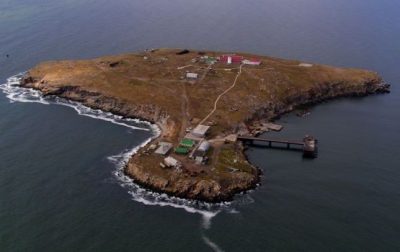UK Allegedly Trained Ukrainian Troops to Retake Snake Island

All Global Research articles can be read in 51 languages by activating the “Translate Website” drop down menu on the top banner of our home page (Desktop version).
To receive Global Research’s Daily Newsletter (selected articles), click here.
Follow us on Instagram and Twitter and subscribe to our Telegram Channel. Feel free to repost and share widely Global Research articles.
***
According to an article published by the Sunday Mirror, the UK Royal Navy’s Special Boat Service trained Ukrainian soldiers to organize an operation to retake and occupy the Zmeiny Island in the Black Sea, popularly called Snake Island, which was under Russian control until recently.
Ukrainian personnel trained by the British Navy would be linked to Kiev’s 73rd Naval Special Purpose Center and would primarily include military divers specialized in amphibious operations, also known as “frogmen”.
In addition to having given instructions, the British would have provided war material appropriate for the service. Sources claim that British agents involved in the training landed in Ukraine holding propulsion devices for divers, which would be used to facilitate the work of the Ukrainian soldiers during the operation. The assault would essentially consist of an amphibious attack, carried out by special divers equipped with British devices, which would allow them to cross long distances submerged without any detection by the Russian forces. Thus, when arriving on the island, the “frogmen” would initiate a surprise confrontation, trying to neutralize their enemies.
It is also mentioned that at a certain time, whose precise date was not revealed, Ukrainian frogmen arrived on the island, secretly carrying out reconnaissance operations, searching for landmines and collecting data to help in the construction of the attack’s strategy. No details are provided in the report about the consequences of such an operation or how Ukrainian agents managed to evade Russian forces.
Regardless of details, the report really seems to be authentic, as in fact this type of work, with extensive use of advanced military diving equipment, modern communication systems, qualified personnel and complex intelligence networks would only be possible with strong foreign support. Although the Ukrainian armed forces are reasonably strong, their current capacity would not allow such a plan to be considered as the country is completely destabilized and has other military priorities. The British Navy, however, is extremely efficient in this type of operation and could undoubtedly help the Ukrainian forces in this objective. So, if in fact there was an attack plan and such a reconnaissance operation really happened, it was only possible because of British logistics.
In this situation we can see the destabilizing power of Western interventionism. If an operation to retake the island were started, Russia would respond incisively, resorting to heavy naval artillery and air power. And the Ukrainian effort, in addition to being a military failure, would be absolutely unnecessary, as the Russians were already planning to leave the island, as in fact they did on June 30, when Moscow’s forces left Zmeiny, showing a gesture of goodwill and diplomacy.
This Russian gesture has an important pragmatic foundation, which is to give Kiev all the necessary conditions to maintain its normal volume of grain exports. With that, the Russian government fulfills its role to avoid the global supply crisis, allowing the grains to be transported by sea using the strategic location of the island. The Russian Defense Ministry even commented on some occasions that, with the departure of troops from Snake Island, Kiev would no longer have any excuse to stop exporting its stored grains.
However, the Ukrainian attitude towards the Russian gesture was precisely an attempt at military “reconquest”. On July 7, Ukrainian troops invaded the island, prompting Russian forces to react with a heavy air strike, resulting in the death of several Ukrainian soldiers. In fact, considering the events, the most likely is that the retake operation planned jointly by the Ukrainians and the British was postponed due to the Russian withdrawal and finally consummated with this failed attack.
July 7 episode just showed what would happen in any Ukrainian invasion attempt on the island: incisive military response and the death of the agents involved in the assault. Kiev did not need to plan any invasion to get the Russians off the island, just show willingness to use it for peaceful purposes, as Moscow was already working to evacuate troops. And, in the same sense, with the island liberated, the right thing to do would be to use it immediately to help exports, not try to turn it into a military base, which Moscow would never tolerate. However, Western interventionism, materialized in the sending of equipment and training of agents, fueled Kiev’s bellicose disposition – and once again made Ukrainian victims.
This case illustrates what experts have been saying for months: Western aid delays the end of the conflict and causes more deaths of Ukrainian soldiers. As long as there is interventionism, the conflict will continue.
*
Note to readers: Please click the share buttons above or below. Follow us on Instagram and Twitter and subscribe to our Telegram Channel. Feel free to repost and share widely Global Research articles.
Lucas Leiroz is a researcher in Social Sciences at the Rural Federal University of Rio de Janeiro; geopolitical consultant. You can follow Lucas on Twitter.

